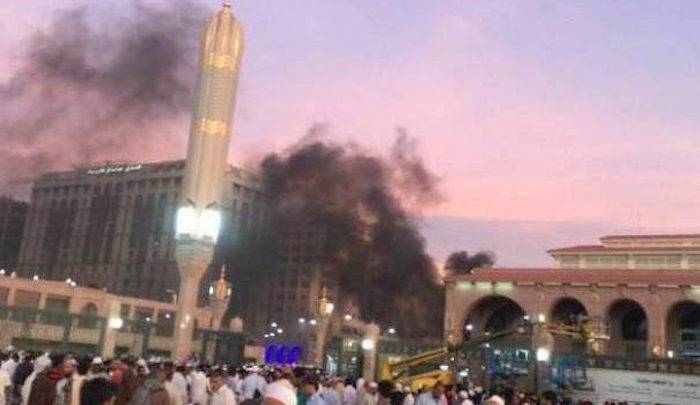Maajid Nawaz already beat me to the critique of the now redundant argument going around that banishes ISIS from Islam due to the attack on Medina. However, I’ll still give my two words on it.
Let’s walk back to January last year. Muath Safi Yousef Al-Kasasbeh is burned alive by ISIS after his F16 plane crashes in Syria. It does not matter whether the plane was downed by, as ISIS claimed, a heat seeking missile or a technical fault. The plane crashed in ISIS held Raqqah and he was soon captured. On the 3rd of January 2015, he was made to stand in a cage and was burnt alive. The video was captured and broadcasted. The world cringed at the sight of the burning skin. Thus died Muath.
The days after were interesting and need to be focused on. Sadly, the world had become immune to ISIS beheading videos but this was a new type of barbarity. There was a strong reaction, so strong that it forced the mullahs of our civilisation to come out of their hibernation and face the sunlight of the day. Was this justified? The humanity at large inquired. The mullahs, after much pondering, stated ‘no’. Islam was a religion of peace they insisted and even if you were to kill an enemy of Islam, it had to be done mercilessly with no pain. The main problem the mullahs had, it seemed, was that Muath had had a tortured death. Maybe a painless death wouldn’t have mattered to them. It is sad we live in a world where the howling of the death gets drowned by the noise of its types.
There was a unified fatwa released against the burning. ISIS was wrong at burning the pilot, it said. Nothing of this sort can be found in Islamic history. ISIS had done wrong. They were not the best of men.
Usually, if we are to see how Al Qaeda and Taliban work, such fatwas are ignored by the accused. Who cares what the general mullah population insists? The believers of the said groups take the words of their emirs as final. Nothing else matters. However, ISIS is another game after all. Given they insist on a caliphate, it is natural they speak to the whole Muslim population. So, in face of these accusatory fatwas, ISIS did something completely different (as compared to Al Qaeda and Taliban), they released their own Fatwa supporting the burning. The one page handout contained hadiths and traditions that supported the burning of Muath, basing the argument on supposed real life incidents. The released handout was interestingly scholarly in its language; or at least as scholarly religious papers can be. So there was a reply. No reply from the mullahs followed.
For the lay Muslim, this was a problem. How to chose who was correct? Who was bluffing? Both contained historical incidents but which incident were true? That’s the thing with historical facts. They are as true as the version of history one believes in.
Let’s move to another example, the Lal Masjid fiasco. There is a standoff between the soldiers of Allah and the soldiers of the state. The politicians want to avoid any violence. No one can battle the Pakistani army, which was a known reality. However, in the ensuing battle, there was less worry about any harm to the Pakistani army and more fear on the loss of lives on the other side. Too many people would die, it was observed, and the reaction to these deaths would be exponential in nature. The predictions were obviously true.
In order to avoid the deaths, politics and bureaucracy was embraced. First the politicians tried but their conversations were futile as they represented infidel state. Thus, a religious leader was tried and who better to use as a pawn than the Imam-e-Kaaba himself. He was called in and he visited the Lal Masjid to hold negotiations. Long story short, the negotiations were completely unsuccessful. The Lal Masjid operation happened and many died in the ‘liberation’.
Here are the concluding remarks: in both these cases, neither party can be termed wrong. Why? Simply because there is no one authority that can disapprove either. Each whimsically proposed a certain interpretation. The followers and the population in general chose their sides as whimsically too. In the world of abundant literature on almost everything, there exists literature that can rationalise almost any and everything. And people read, ingest and support the literature they want to. That’s the thing with faith, one needs belief, not facts.
What should the lay man believe in? It is absolutely pertinent that the mullahs of the world unite and form a council that can act as a single authority in such matters. There needs to be a formal process of approving and disapproving. Only then can the common man truly find his bearing in this confused world. Only then can one truly be in and out of Islam.






